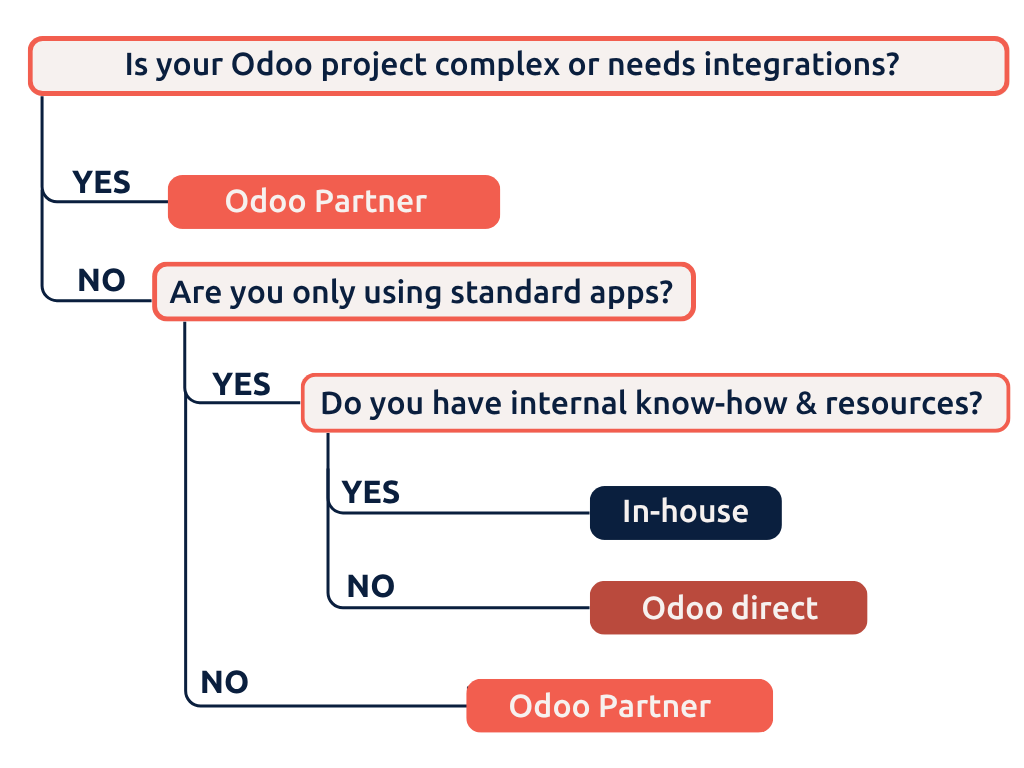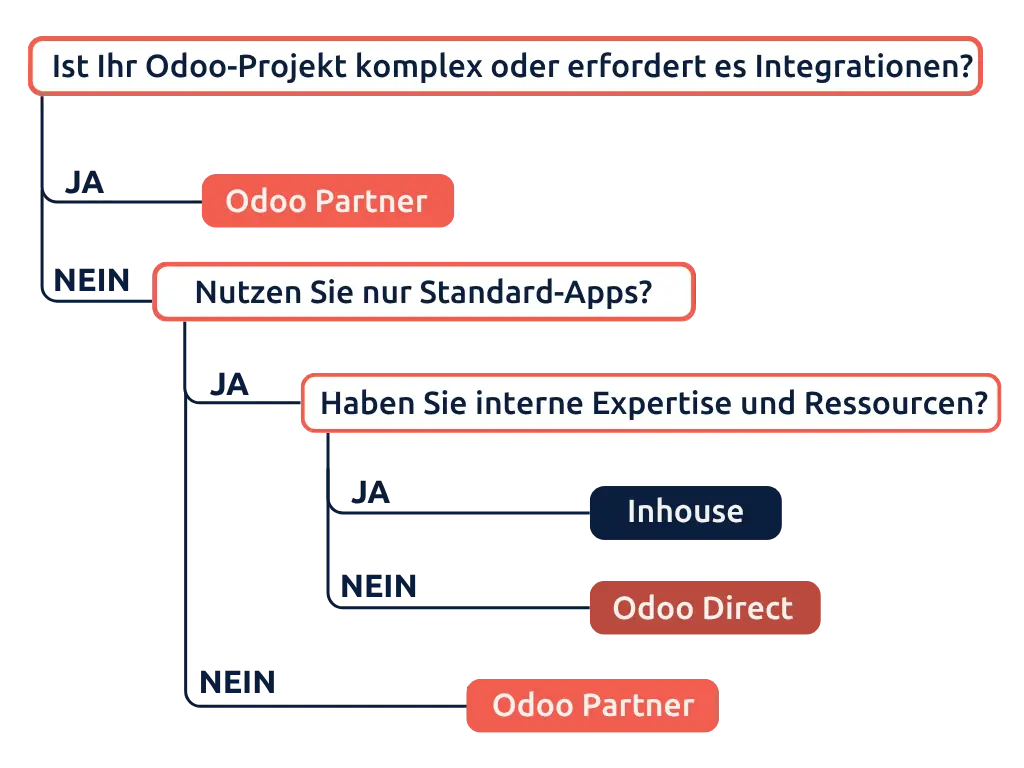“Should we implement Odoo ourselves, go with Odoo’s implementation services (Odoo direct) or go with an official Odoo Partner?”
It’s a fair question. After all, the choice of support for your implementation can make or break your entire Odoo project.
Some try it alone. Some opt for Odoo’s internal support. Others partner with certified consultants who manage the whole implementation end-to-end.
To help you make the right call, we’ve broken down how each option works, what it offers, and if it fits your business needs.


Table of content
In-house Odoo implementation requires internal expertise and long-term capacity
Odoo direct supports implementations for standard setups
Odoo Partners manage complex projects and build unique Odoo architectures
Odoo projects run differently based on who’s implementing it
In-house Odoo implementation requires internal expertise and long-term capacity
Some businesses choose to implement Odoo entirely in-house.
This option skips external guidance and depends on your team’s ability to configure, test, and manage the system independently.
Good choice when:
- The internal team has strong technical and process knowledge
- The project involves only core apps like CRM, Sales, or Project
- The company has time to manage scoping, testing, and iterations internally.
Not ideal due to:
- Poor architecture and long-term technical debt
- Scope creep due to unclear boundaries or goals
- Missing out on features or best practices not discovered during setup.
Example: Where in-house Odoo implementation works
A tech-savvy SME configures its own CRM and Project apps without external support. They accept limited scalability and rely on trial-and-error to evolve the setup over time.
Odoo direct supports implementations for standard setups
Odoo offers internal consulting for companies with basic requirements.
Odoo provides configuration support through scheduled sessions and online guidance but they don’t take ownership over managing your project.
Good choice when:
- The company uses standard apps like CRM, Sales, or basic Accounting
- Fewer than 10 users need access
- No integrations, automations, or data migration are needed
- Internal teams can lead the configuration, testing, and rollout.
Support is offered through pre-paid hourly blocks. Odoo consultants support in configuring features, but they don’t take ownership of the system setup or go-live process.
Not ideal due to:
- No discovery, workshops, or system design
- No custom development or integrations
- No post-launch support or iterative improvements.
Example: Where Odoo direct implementation works
A marketing agency uses CRM and basic Accounting without custom Marketing flows.
They consult Odoo for initial setup guidance and complete the rollout and maintenance internally.
Odoo Partners manage complex projects and build unique Odoo architectures
Certified Odoo Partners take full responsibility for system delivery.
They plan, configure, develop, and support the implementation based on your business needs.
Good choice when:
- The project is large-scale and spans multiple departments or locations
- The company is migrating from legacy systems or spreadsheets
- Custom workflows, localisation, or compliance are required
- Integrations are needed, whether they’re custom-made or adapted into your system
- The implementation will be rolled out in phases.
Partners align the system to your internal processes and provide long-term support beyond go-live.
Main advantages include:
- A dedicated delivery team that owns the project
- A structured rollout with scoping, testing, and feedback loops
- A dedicated delivery team that owns the project
But not all Odoo Partners are equal.
Some introduce artificial vendor lock-in through compiled customisations. Others rely too heavily on templates or skip the concept phase when it's still needed.
Odoo Partner red flags - what to watch out for:
- Compiled files or other lock-in methods that violate open-source principles
- Missing documentation or handover plans
- Poorly scoped projects that stall after go-live
- Over-customisation without clear justification.
Choose a Partner who explains their approach and gives you long-term control over your system.
Example: Where Odoo Partner implementation works
A German wholesaler implements Inventory, eCommerce, and DATEV Accounting.
They need warehouse automation, custom workflows, and integrations for accounting compliance and eCommerce.
An Odoo Partner scopes, builds, and supports the project across multiple phases.
Odoo projects run differently based on who’s implementing it
No matter how you choose to implement Odoo, key stages must be covered in the process.
But who delivers what and how structured each step is changes drastically between in-house, direct, and Partner-led implementations.
From our experience as an Odoo Partner, this is what the delivery process typically looks like.
Be aware: Some steps may be shortened, skipped, or combined depending on the complexity of the setup and who’s responsible for the implementation.
Some projects skip steps, especially when the internal team already has clear requirements.
Others benefit from a full delivery process that builds in testing, training, and long-term scalability.
1. Scoping and app validation
- Happens in all setups, but is often informal in in-house delivery.
2. Process design and requirements gathering
- Skipped in in-house and direct setups.
- Included in Odoo Partner-led projects if needed, some customers already come with clear requirements.
3. System configuration
- Included in all setups led by in-house teams, Odoo direct, or Odoo Partners.
4. Development and extensions
- Not supported in Odoo direct setups
- Done manually in-house or scoped as part of Odoo Partner delivery.
5. Data migration and validation
- Basic support in Odoo direct setups
- Fully manual in-house
- Fully supported by your Odoo Partner.
6. Testing and team feedback
- Minimal testing in in-house/Odoo direct setups
- Structured testing and user feedback in Odoo Partner delivery.
7. An exclusive helpdesk
- Included in all models, levels of ownership may vary.
8. An exclusive helpdesk
- Not included in in-house approach
- Limited online support in Odoo direct implementations
- Generally available with Odoo Partner implementations, from managed services to dedicated support.
Key differences across Odoo implementation methods
Odoo direct implementations prioritise speed and standardisation when implementing simple setups.
In-house delivery requires hands-on ownership of every step, from planning to post-launch.
Odoo Partner delivery ensures structure, scope, and long-term ownership of your ERP project.
Factor | In-house Implementation | Odoo Direct Support | Odoo Partner Delivery |
Project ownership | Internal team | Shared | Partner-led |
Process workshops | Not included | Not included | Optional or included |
Customisation* | Possible often via Studio, with risks | Limited to Studio only | Scoped and developed according to customer needs |
Integrations | Community tools or DIY | Only prebuilt connectors | Built or configured |
Data migration | Manual or scripted | Basic templates | Fully supported |
Testing and feedback | Internal effort | Basic checks | Structured feedback loops |
Post-go-live support | Not included | Not included | Included |
Scalability | Rebuild over time | Limited | Built into project roadmap |
*Odoo Studio allows users to add fields, tweak views, and build small automations, which is especially useful in smaller or in-house setups.
However, changes made in Studio can become difficult to maintain or upgrade.
For long-term stability, larger projects often rely on structured development instead.
Implementation methods can make or break your Odoo project
Should we go directly with Odoo, do it ourselves, or work with an Odoo Partner?
Every Odoo implementation starts with that one decision. It defines how your project will be delivered and how well it will hold up over time.
Go with an Odoo Partner when…
The project spans multiple teams, processes, or systems.
There’s a need for development, migration, or structured rollout.
Long-term support and scalability matter from the start.
Go with Odoo direct support when…
The setup is standard and self-contained.
No integrations, localisations, or advanced workflows are needed.
You only need guidance on configuration, not project delivery.
Go with an in-house implementation when…
The team has technical skills and time to manage the system.
Internal processes are well defined.
Customisation needs are minimal or can be fully handled internally.
Work with an Odoo Partner who understands your setup needs
Odoo gives you the tools to manage your operations, but the way you implement them makes all the difference.
As an Odoo Gold Partner, we support full project delivery with structure and scope. Reach out to our Odoo experts for a tailored implementation plan with long-term thinking built in.